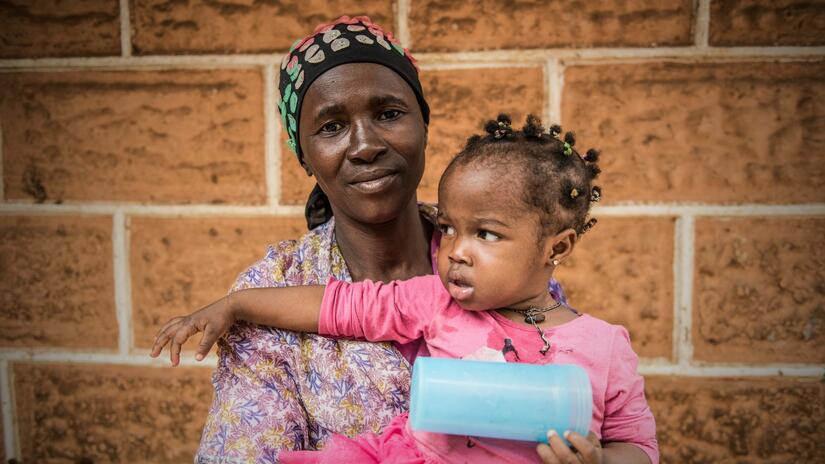Nairobi/Geneva, 5 July 2021 - The International Federation of Red Cross and Red Crescent Societies (IFRC), Africa Region is calling on its partners to do more to protect children amid increasing vulnerabilities due to climate-related disasters. This call comes ahead of the upcoming Africa Dialogue/Anticipatory Action event.
Mohammed Mukhier, the International Federation of Red Cross and Red Crescent Societies’ (IFRC) Regional Director for Africa said:
“As drought and food insecurity take hold, we see again that Africa is one of the most vulnerable regions to the effects of climate change and its related disasters. IFRC is deeply concerned about the disproportionate level of protection risks against children across Africa posed by climate related disasters. Anticipating need and taking effective action is essential.”
IFRC is calling on all humanitarian actors to do a better job at preventing children from increased violence, abuse and exploitation. IFRC’s study, “We Need To Do Better” shows that climate related disasters puts pressure on protective systems, leaving families in desperate situations, and reducing children’s chances of shaping their own futures.
Mukhier added: “Climate change related extreme weather and rising temperatures have increased the frequency of droughts and floods in Africa and around the world, leading to knock-on effects such as economic hardship, child labour, severe malnutrition, lack of access to clean water and WASH facilities, child marriage and lower school attendance. The consequences of these are felt today and will continue to undermine children’s protection for years to come. We need to invest more in preventative action including anticipatory action with a specific lens on child protection.”
Presently, the menace of floods, COVID-19, conflict, and locusts in parts of the African region, linked to the warming climate, is a key example of the risks. Yet, this may worsen in the coming months, especially between June and August 2021, with the exacerbation of food insecurity.
Furthermore, climate related displacement is a significant concern. Rapid and slow onset environmental degradation diminishes living conditions, forcing families to leave their homes and often separate from their children. Many children are also forced to reside in unsafe refugee and IDP camps in countries across the continent where they are at risk of trafficking, recruitment into armed groups and sexual violence.
Climate related disasters in the region also threaten children’s access to school including through forcing schools to close, intensifying dropouts, families having to choose between school and livelihoods, and making transport and access to school hard for the poorest. This is already happening in Eastern and Southern Africa, where around 28 per cent of the children are unable to attend school. The lowest attendance rates are observed in the Horn, where climate related disasters are particularly prevalent.
School attendance is vital for children because—apart from education—learning institutions provide an environment that protects children from abuse, violence and exploitation.
Children’s mental health is also affected by the short and long-term impacts of repeated disasters. Instability and separation from family can exacerbate the stress and trauma of the experience. Psycho-social support is crucial for the emotional wellbeing, mental health and development of children.
Girls are at particular risk in climate related disasters as they experience unequal access to school, resources and decision-making, particularly in areas facing severe poverty. During and after climate related disasters, girls are more vulnerable to sexual abuse, exploitation, and trafficking. Child marriage, for example, may be used as a coping mechanism by families who experience economic hardship induced by environmental disasters. Girls who are married are at risk of physical and sexual abuse, poor nutrition, and increased chance of maternal neonatal death.
Mukhier called for a more proactive approach: “Local humanitarian actors need to take urgent, coordinated, and preventative actions to better protect children from the dire consequences of climate related disasters in the Africa region. We need to better anticipate protection needs and take practical actions. Children have not contributed to the climate crisis and yet they carry its heaviest burdens today and for the decades to come. We need to do better to ensure we work with children as partners and prioritize their protection and education.”
The IFRC urges humanitarian actors to: (1) recognize the impact of climate change related disasters on children; (2) invest in child protection and education systems, including localized coordination mechanisms; (3) include children, both boys and girls, in climate disaster related decision-making processes and the development of local solutions; and (4) prioritize anticipatory action to protect children from the impacts of climate disasters.
Article
A severe and prolonged cold spell in Mongolia – known as the ‘dzud’ – is taking a deep toll on rural livestock herders
A severe and prolonged cold spell in Mongolia – known as the ‘dzud’ – is taking a deep toll on rural livestock herders
| Article

